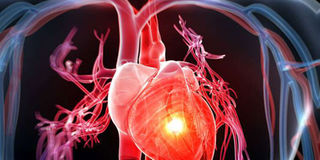Scientists raise alarm over high carbohydrate intake

A human heart. High carbohydrate intake is not healthy for the heart. FILE PHOTO
What you need to know:
- The research found that high carbohydrate intake was associated with a higher risk of total mortality.
- Researchers say that an ideal diet would consist of roughly 50 to 55 per cent carbohydrates and 35 per cent fat.
Carbohydrates may cause more harm than fat to the heart, scientists say.
Researchers from the Prospective Urban Rural Epidemiology (PURE) study came to the conclusion after examining the eating habits of 135,335 people from 18 countries.
Study findings published last month appear to challenge long-held beliefs on the harmfulness of fat in diet, naming high carbohydrate intake as a bigger culprit in the risk of developing heart disease
DIET
The PURE research is a large study of individuals aged 35-70 years who were enrolled between January 1, 2003, and March 31, 2013, in 18 countries with an average follow-up period of 7.4 years assigned to each subject.
Project team members observed people from different economic and geographical backgrounds and gathered data over a 10-year period, from 2003 to 2013.
During the study, the dietary intake of 135,335 individuals was recorded using validated food frequency questionnaires.
DISEASE
According to the scientists, carbohydrates were found to have “the most adverse impact on cardiovascular risk factors”, as opposed to fat.
“During follow-up, we documented 5,796 deaths and 4,784 major cardiovascular disease events.
"Higher carbohydrate intake was associated with an increased risk of total mortality but not with the risk of cardiovascular disease or cardiovascular disease mortality,” the report published medical publication The Lancet says.
FAT
The research found that high carbohydrate intake was associated with a higher risk of total mortality, whereas total fat and individual types of fat were related to lower total mortality.
“Total fat and types of fat were not associated with cardiovascular disease, myocardial infarction, or cardiovascular disease mortality. Global dietary guidelines should be reconsidered in light of these findings,” the report went on.
In a position that differed with long-held beliefs on fatty diets predisposing individuals to cardiovascular disease, the study poured cold water on the dietary conventions, recommending a low-carbohydrate diet, with a higher fat intake of 35 per cent instead of the widely accepted 30 per cent.
Researchers say that an ideal diet would consist of roughly 50 to 55 per cent carbohydrates and 35 per cent fat.





